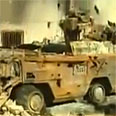
WASHINGTON – The site of the alleged Israeli strike in Syria last week was the country’s main biological and chemical weapons research center, the New York Times reported Monday.
Citing "senior US security sources," the newspaper said that the center had known ties to a North Korean research center of the same kind.
Related stories:
- Assad: Strike aimed at destabilizing Syria Lebanese FM calls for boycott of Israel
- Syria, Iran threaten retaliation against Israel
Various foreign security officials hedged that IAF jets hit a convoy of SA-17 anti-aircraft missiles traveling towards the Lebanese border, ahead of a handoff to Hezbollah militants.
Israel has remained mum on the matter, but Defense Minister Ehud Barak, in a first – albeit ambiguous – comment by an Israeli official, said Sunday that while he could not directly comment on the foreign reports insisting Israel was responsible, "When we say something, we mean it… we said that we don't think it should be allowed to bring advanced weapons systems into Lebanon, to Hezbollah, from Syria when Assad falls."
Syria denied the attack at first, but eventually admitted it was hit, allowing its state-run television station to air a video showing that a research center north of Damascus was damaged.
According to the NYT, the Syrian Scientific Studies and Research Center, "Has been the target of American and Western sanctions for more than a decade because of intelligence suggesting that it was the training site for engineers who worked on chemical and biological weaponry."
Several US security sources said that Jerusalem had informed Washington of the impending strike. A senior US military official said that “the Israelis had a small strike package,” meaning, according to the NYT, that "a relatively few fighter aircraft slipped past Syria’s air defenses and targeted both the missiles and the research center."
"They clearly went after the air defense weapons on the transport trucks," the American official said.
Security experts said that the ease with which Israeli planes reached the Syrian capital was most likely also meant to send a message to Assad, as well as to Iran – a known sponsor of both the regime in Syria and the Shiite terror group.
"Israel has said that if it saw chemical weapons on the move, it would act to stop them. By hitting the research center, part of a military complex that is supposed to be protected by Russian-made antiaircraft defenses, Israel made it clear it was willing to risk direct intervention to keep weapons and missiles out of Hezbollah’s hands," the New York Times said.
It is believed that the alleged Israeli strike in Syrian was also meant to signal to the Islamic Republic that Israel would be willing – and is capable – of carrying out a similar strike on Tehran's nuclear facilities if it seemed that Iran was near achieving nuclear weapons capability.
- Receive Ynetnews updates
directly to your desktop















